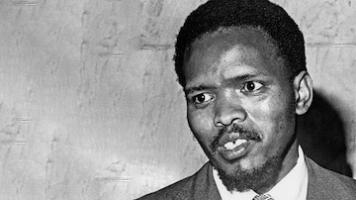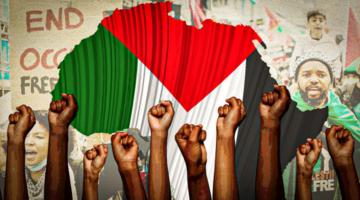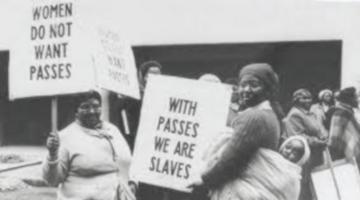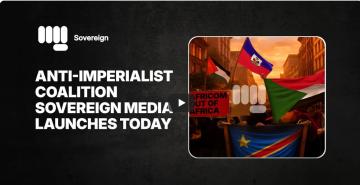12 April 2022: Flood-damaged homes in the eNkanini shack settlement in Cato Crest, Durban, South Africa. (Photo: Rogan Ward)
The floods that have wreaked havoc in the shacklands of Durban, South Africa are another searing indictment of the social abandonment of the majority by a predatory political elite.
This article was first published by New Frame.
The openly kleptocratic faction of the ANC has always had its strongest base in Durban. This is the city from which the late John Mchunu used his position as the regional chairperson of the party to organise the campaign that took Jacob Zuma to the presidency. In the Zuma years, the extent to which the country was run from Durban was significant.
It is here that the axe of day-to-day political repression falls hardest, and most frequently. Violence and the threat of violence have been normalised. In much of the city, automatic weapons are now an unremarked on and ordinary feature of political meetings.
Activists have their homes burnt, are beaten, tortured, arrested and jailed for long periods on farcically bogus charges and, all too often, murdered. The izinkabi, party thugs, the police and now elements in the prosecuting authority operate together to protect the political mafia that has captured the ANC and the City Hall.
That mafia has institutionalised itself in the city’s procurement policies and in the party’s structures in the wards where there is now formal accommodation for the “business forums” that seek to capture public money in the name of “radical economic transformation”.
The election of Zandile Gumede as the eThekwini regional chairperson of the ANC is a clear signal that, despite the party’s significant setback at the polls, its most brazen mafia – the radical economic transformation faction in Durban – are not beating any sort of strategic retreat.
The capture of governance by a mafia has many consequences, including the murder of activists. Another of those consequences is that money collected and allocated for social purposes – such as building and maintaining infrastructure, providing housing and so on – is appropriated for the private enrichment of a small, politically connected elite.
Every rand that goes into another McMansion in uMhlanga, or on another Italian sports car, is a rand taken away from building houses, or even the more modest work of making shack settlements a little safer and more liveable.
Lives made in mud
Durban’s hilly terrain means there is open land for impoverished people to occupy within the city, close to schools and opportunities for work. Here, shack settlements are not always on the urban periphery. But this terrain also means that large numbers of people often live together on steep slopes. Many settlements are alongside the streams that run through the valleys, streams that turn rapidly into torrents of angry water when heavy rain lands on hard surfaces without adequate drainage and rushes down slopes denuded of vegetation by the construction of shacks.
Even ordinary levels of rain turn these settlements into waterlogged places sitting on mud considerably higher than ankle-deep. It is standard for people’s homes to be full of water and mud, with water running under their beds. This is extremely uncomfortable. Residents often spend days with plastic bags tied over their shoes. Navigating steep slopes that have turned to thick mud is particularly dangerous for older people. Broken limbs are common.
The fact that the municipality has not bothered to pave paths and install basic drainage in the settlements is just one sign, among many, of the systemic contempt with which impoverished people are treated. Its failure to collect rubbish from these areas is another. And the drainage that does exist around shack settlements, built for the adjacent suburbs, gets blocked quickly when rain carries uncollected refuse into poorly maintained drainage systems.
The weather has not been an entirely natural phenomenon for a long time, since humans first began cutting down the vast forests that once covered much of Europe and North America. The scale of human impact on the weather and broader climate systems escalated rapidly with the onset of industrialisation driven by fossil fuels. But while the worsening climate crisis requires urgent attention, we cannot say that a particular municipality is responsible for the amount of rain that falls in its jurisdiction.
A politics of contempt
But the failure to make provision to keep people safe when the rain does come, to maintain existing infrastructure and to build new infrastructure, is the full and direct responsibility of those who allocate and oversee municipal expenditure.
In the same way that the tuberculosis epidemic and shack fires are a material expression of a politics of elite contempt, so too is much of the damage wreaked by floods. We can’t stop the rain, but we can prepare for it in a way that assumes the equal dignity and equal value of the lives of all residents.
But without a decisive political shift, the cycle of fire and flood will continue to shape the lives of impoverished people. Durban has by far the most extensive and impressive forms of popular organisation in the country. But while such organisation has defended much and won much, it has not acquired the strength to dislodge the political mafia that runs the city.
Nationally, it is on the Right that new forces are emerging and cohering on the terrain of electoral politics. As is common in much of the world, the deliberate incitement of and pandering to xenophobia has become a key technique for the Right to build political vehicles that exploit people’s suffering for electoral gains while aligning with the same forces that produce and sustain that suffering.
It is the Right that is currently best placed to profit from the decline in the standing and power of the ANC. Well-intentioned top-down initiatives, from non-governmental organisations to activists last rooted in popular organising in the 1980s, will not change this. Popular democratic power is always built from below. Right now the task of building mutually respectful alliances between the mass-based organisations of the Left, alliances rooted in practical forms of solidarity, could hardly be a more urgent starting point for the project to rebuild the Left as a national force.
New Frame is a not-for-profit, social justice media publication based in Johannesburg, South Africa.



















